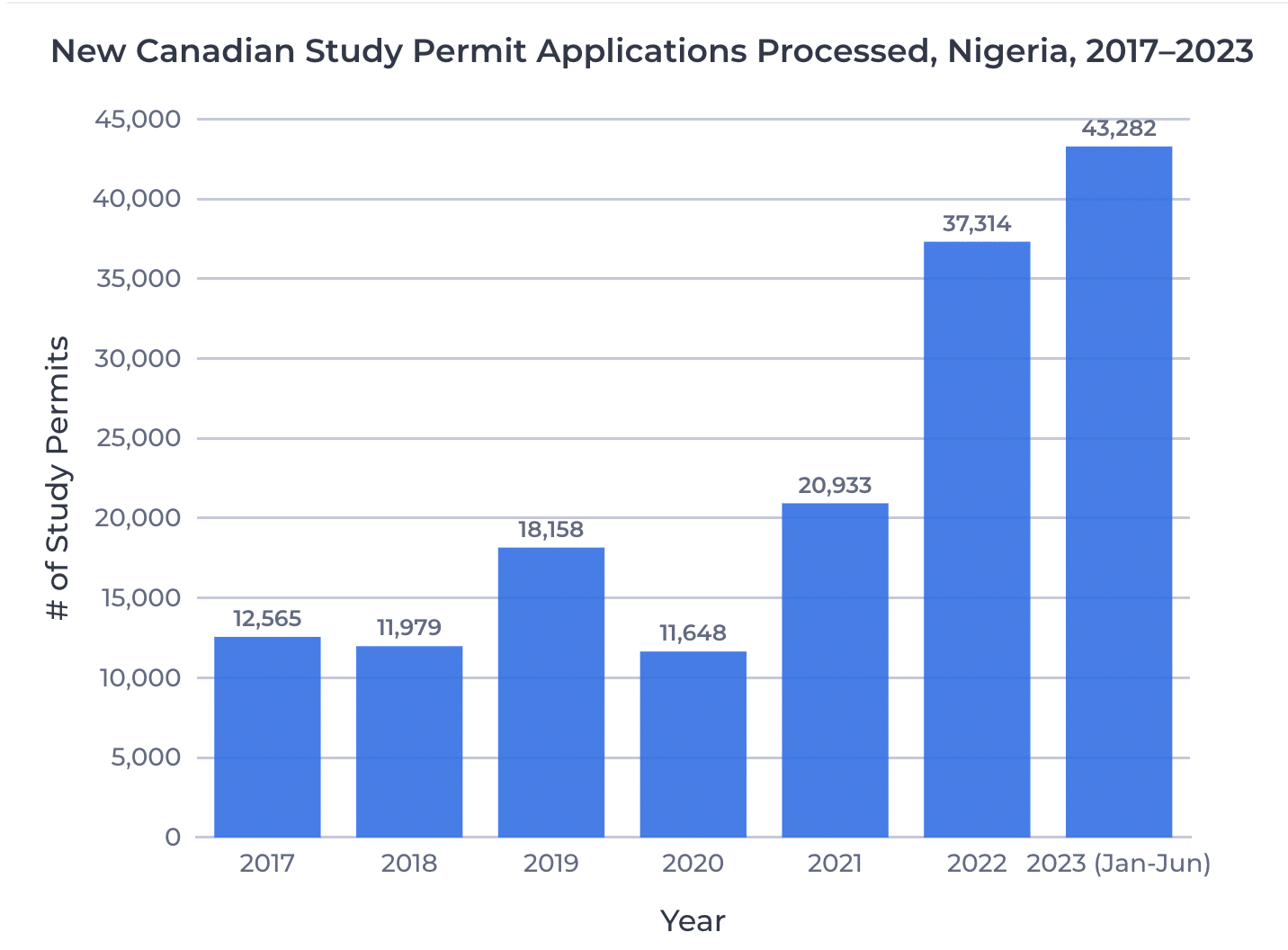The Canadian government issued just over 3,000 student visas to Nigerian nationals in 2019. By 2021, that number doubled, which doubled again in the year 2022. Nigerians have become the country’s fastest-growing student population amid the increase in the international student population.
ApplyBoard report examined student mobility trends for Nigerian students. The report showed the following insights:
- Nearly 18,000 Canadian study permits were issued to Nigerians in the first six months of 2023, more than for any other country but India.
- Nigerians were Canada’s fastest-growing international student population from January to June 2023, with 44% more study permits issued during that period than in all of 2022.
- Study permit approval rates for Nigerians continued to rise across the first six months of 2023 to just under 40%. That’s more than double what approval rates were in 2020.
- Nigerian students are more evenly distributed across Canada than average. Manitoba, Nova Scotia, Saskatchewan, and New Brunswick each accounted for more than 5% of study permits issued to Nigerians from January to June 2023.
Approval rates for Nigerian study permits
Nigeria ranked third after India and China from 2017 to 2019. However, the study permit approval rate was below 20%, resulting in a small percentage of Nigerian students being able to pursue their studies in Canada.
In the first half of 2023, Nigerian students submitted over 43,000 study permit applications, positioning them as Canada’s second-largest group of incoming students.
The chart below shows the growth in study permit applications since 2017.

Nigerian students’ ability to come to Canada is heavily reliant on approval rates. In the years 2021 and 2022, ApplyBoard reported that insufficient finances were cited as the reason for refusal in 74% of study permit refusals for Nigerians.
The Canadian government was scrutinized for its low student visa approval rates for African students last year. This led to a study by the House of Commons Standing Committee on Citizenship and Immigration, which laid out recommendations for improving the fairness and transparency of the study permit approval process. Since the pandemic, approval rates have increased for African countries.
The Provinces Nigerian students are choosing to study in Canada
In the first half of 2023, study permit issuance to Nigerian students increased in eight out of ten provinces compared to the entire year of 2022. Nova Scotia experienced the most significant growth, with more than double the number of study permits issued in 2022. This places Nova Scotia third in terms of study permit issuance, following Ontario and British Columbia.
Although Ontario and British Columbia were top study destinations, Nigerians were far less concentrated in those areas than average.
Across Ontario, British Columbia, the prairie provinces and Atlantic Canada, Ontario and BC accounted for around 63% of study permits issued to Nigerians in the first six months of 2023. This is in comparison to nearly 84% of students who chose those two provinces as a destination across all countries of origin.
Why are Nigerian students significant to Canada’s international education sector?
Canada has issued more than 6,500 study permits to Nigerian students in the first half of 2023, already a record for the full year.
ApplyBoard recognizes the growing trend of international students choosing Ontario universities and colleges for their studies. In light of this, ApplyBoard emphasizes the significance of the Nigerian student population in sustaining the international education sector in other provinces. This, in turn, contributes to the overall benefit of Canada.
In addition, the United Kingdom has recently announced its decision to restrict the entry of dependents for most international students. This development presents a favorable opportunity for Canada, as it is the largest competitor for Nigerian students. Consequently, Canada can leverage this situation to gain a significant recruitment advantage and maintain its reputation as a welcoming destination for Nigerian students.
Nigerian permanent residents in Canada
In 2022, Nigeria was the fourth most common country of origin for new permanent residents in Canada, following India, China, and Afghanistan. Canada welcomed 22,085 new permanent residents from Nigeria in 2022, accounting for over 5% of Canada’s total permanent resident population.
One of the main benefits of studying in Canada as an international student is the ability to utilize the Post-Graduation Work Permit (PGWP) after completing an education program and the opportunity to be granted permanent residence in Canada.
PGWPs are the main way for international students to work in Canada upon graduation from a Canadian Designated Learning Institution (DLI). The PGWP is an open work permit that allow holders to work for any Canadian employer of their choice for a maximum of three years.
The work experience gained through a Post-Graduation Work Permit (PGWP) can be highly advantageous for individuals seeking permanent residency (PR) in Canada. This is because many immigration pathways in Canada offer direct incentives to candidates who have Canadian work experience. According to data from Statistics Canada, nearly three-quarters of all PGWP holders became permanent residents within five years of obtaining their PGWP.




